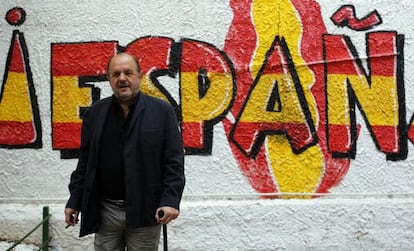Extremists disguised as Samaritans
The far right in Spain is aping the methods of Golden Dawn in Greece and gaining ground

A sign outside the ramshackle house warns: "Area under guard." The social office of far-right party España 2000 in Valencia takes care of entire families who are in need of provisions. The group attends to the needs of desperate members of the community in much the same way as Golden Dawn in Greece, distributing food among people on the verge of ruin.
The founder of España 2000, José Luis Roberto, directs his not-for-profit organization, created two years ago, from his headquarters in Valencia. A truck collects supplies from the city's food bank and hands it out to 36 families living in poverty. Jaime Sierra, director of the food bank, which describes itself as "apolitical and non-confessional," says that the supplies come from a regional subsidy authorized by the Agriculture Ministry, and that his organization merely manages it among 300 beneficiary organizations.
Food from the European Union (pasta, rice, tinned products) is distributed among all-comers by España 2000. "Including foreigners," says Roberto. However, other charitable work by the group, such as the beds it offers to homeless people, are characterized by discrimination.
"Would you let a Moroccan in to sleep?"
España 2000's leader points out his wife is Lithuanian and his son Venezuelan
"No, not while there is a waiting list of Spaniards."
Six of seven the beds currently occupied contain Spanish nationals. The exception is a Russian, who has been a member of España 2000 for eight years. All consider themselves ultras; aligned with the far right. José Gómez, 58, describes his ideology as extremist. He worked in construction until three years ago and has two daughters. Cristóbal Cardenas, 47, says that his activism as a falangist is the reason he is unemployed.
On a platform of repatriating immigrants, España 2000 won five regional councilors in Valencia and one in Alcalá de Henares, the third-most-populous satellite town of the capital, in the last regional elections. It has become the second-largest extremist force in Spain, behind Plataforma per Catalunya, led by Josep Angalada, which has 67 councilors in the northern region.
España 2000 rejects Islam. It collected 1,150 signatures on a petition to have the mosque in Onda, Castellón, removed. There have been several attempts to burn it to the ground. Is España 2000 xenophobic? "No," responds Roberto, adding that his wife is Lithuanian and his son Venezuelan. He bases the group's ideology on the flaws in the system, railing against the banks and evictions. The separatist "danger" is now a secondary matter. He speaks of a "social patriotic" revolution in Spain, from top to bottom. His headquarters was attacked last year by "extremists from the left," who smashed up a car and threw petrol bombs.
One member says that his activism as a falangist is the reason he is jobless
To unravel the DNA of this far-right group it is necessary to visit Silla (19,213 residents). One in 10 people here voted for España 2000 in the regional elections. The group has 500 members in Silla, most of them youngsters who shun the traditional political formations. However, the conurbation lacks the usual nutrients that feed extremism. Its unemployment rate is three points below the regional average. There are no major security issues and integration is good.
The driving force of the phenomenon is called Andrés Vicent, España 2000's spokesman in the area, who is in his second legislature. He has called for the annual property tax to be reduced and complained about the "foreign ghetto" at the town's public high school. Only 13 percent of Silla's population is non-Spanish. Vicent rejects the traditional ideological philosophy yet talks in sound-bites from the historic far-right: "We are very involved in the social crusade."
Silla's other España 2000 councilor, Alejandro Serrador, has been named a suspect in a case dating back to 2005; Operation Panzer. The probe broke up an alleged neo-Nazi ring in Valencia, which possessed a grenade launcher and spread National Socialist ideology via the internet.
España 2000 has drawn attention to itself by stunts such as driving through Valencia in an A-Team-style vehicle to protest against the immigrant "invasion" or organizing a boxing contest in Gandia, which was sponsored by the local Popular Party administration. Last year the regional Compromís deputy, Mónica Oltra, had books and stink bombs thrown at her at a lecture by sociologist Vicent Flor, who the far-right accuses of having Catalan sympathies. In 2010 United Left regional deputy Amadeu Sanchis was ordered to pay Roberto 500 euros for calling the ultras "bands of terrorists."
Jörg Haider's rise came through the votes of disaffected working-class people
The extreme right is advancing stealthily in Catalonia and Valencia, where it has reinvented itself with populism against Madrid, says historian Xavier Casals, who notes that the rise of Jörg Haider came about through the votes of disaffected working-class Austrians. And it is Valencia's poorest neighborhoods, such as Benicalap and Fuensanta, where España 2000 is gaining ground. Casals compares the fragmented Spanish far right with that of Germany, where groups like the National Democratic Party, one of the most radical in Europe, are winning support.
Tu suscripción se está usando en otro dispositivo
¿Quieres añadir otro usuario a tu suscripción?
Si continúas leyendo en este dispositivo, no se podrá leer en el otro.
FlechaTu suscripción se está usando en otro dispositivo y solo puedes acceder a EL PAÍS desde un dispositivo a la vez.
Si quieres compartir tu cuenta, cambia tu suscripción a la modalidad Premium, así podrás añadir otro usuario. Cada uno accederá con su propia cuenta de email, lo que os permitirá personalizar vuestra experiencia en EL PAÍS.
¿Tienes una suscripción de empresa? Accede aquí para contratar más cuentas.
En el caso de no saber quién está usando tu cuenta, te recomendamos cambiar tu contraseña aquí.
Si decides continuar compartiendo tu cuenta, este mensaje se mostrará en tu dispositivo y en el de la otra persona que está usando tu cuenta de forma indefinida, afectando a tu experiencia de lectura. Puedes consultar aquí los términos y condiciones de la suscripción digital.









































